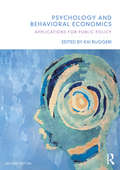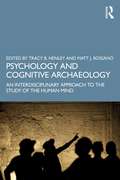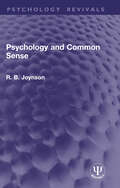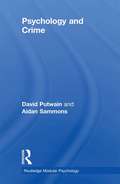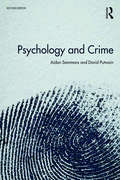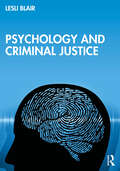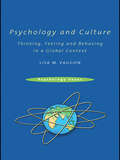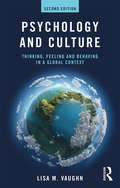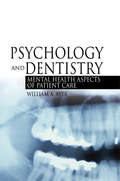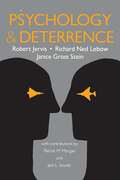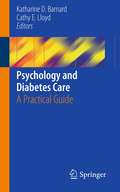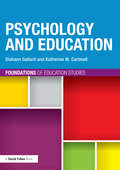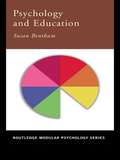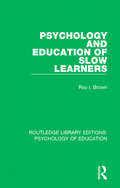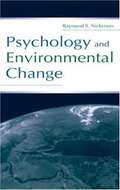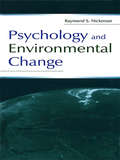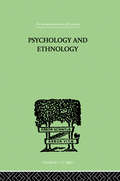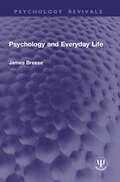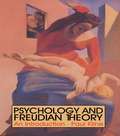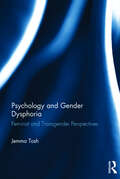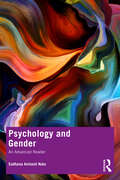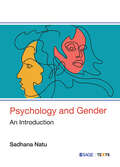- Table View
- List View
Psychology and Behavioral Economics: Applications for Public Policy
by Kai RuggeriPsychology and Behavioral Economics offers an expert introduction to how psychology can be applied to a range of public policy areas. It examines the impact of psychological research for public policymaking in economic, financial, and consumer sectors; in education, healthcare, and the workplace; for energy and the environment; and in communications. Your energy bills show you how much you use compared to the average household in your area. Your doctor sends you a text message reminder when your appointment is coming up. Your bank gives you three choices for how much to pay off on your credit card each month. Wherever you look, there has been a rapid increase in the importance we place on understanding real human behaviors in everyday decisions, and these behavioral insights are now regularly used to influence everything from how companies recruit employees through to large-scale public policy and government regulation. But what is the actual evidence behind these tactics, and how did psychology become such a major player in economics? Answering these questions and more, this team of authors, working across both academia and government, present this fully revised and updated reworking of Behavioral Insights for Public Policy. This update covers everything from how policy was historically developed, to major research in human behavior and social psychology, to key moments that brought behavioral sciences to the forefront of public policy. Featuring over 100 empirical examples of how behavioral insights are being used to address some of the most critical challenges faced globally, the book covers key topics such as evidence-based policy, a brief history of behavioral and decision sciences, behavioral economics, and policy evaluation, all illustrated throughout with lively case studies. Including end-of-chapter questions, a glossary, and key concept boxes to aid retention, as well as a new chapter revealing the work of the Canadian government’s behavioral insights unit, this is the perfect textbook for students of psychology, economics, public health, education, and organizational sciences, as well as public policy professionals looking for fresh insight into the underlying theory and practical applications in a range of public policy areas.
Psychology and Catholicism
by Robert KugelmannIn this historical study of psychology and Catholicism, Kugelmann aims to provide clarity in an area filled with emotion and opinion. From the beginnings of modern psychology to the mid-1960s, this complicated relationship between science and religion is methodically investigated. Conflicts such as the boundary of 'person' versus 'soul', contested between psychology and the Church, are debated thoroughly. Kugelmann goes on to examine topics such as the role of the subconscious in explaining spiritualism and miracles; psychoanalysis and the sacrament of confession; myth and symbol in psychology and religious experience; cognition and will in psychology and in religious life; humanistic psychology as a spiritual movement. This fascinating study will be of great interest to scholars and students of both psychology and religious studies but will also appeal to all of those who have an interest in the way modern science and traditional religion coexist in our ever-changing society.
Psychology and Cognitive Archaeology: An Interdisciplinary Approach to the Study of the Human Mind
by Tracy B. HenleyPsychology and Cognitive Archaeology demonstrates the potential of using cognitive archaeology framing to explore key issues in contemporary psychology and other behavioral sciences. This edited volume features psychologists exploring archaeological data concerning specific themes such as: the use of tools, our child-rearing practices, our expressions of gender and sexuality, our sleep patterns, the nature of warfare, cultural practices, and the origins of religion. Other chapters touch on cognitive archaeological methods, the history of evolutionary approaches in psychology, and relevant philosophical considerations to further illustrate the interdisciplinary potential between archaeology and psychology. As a complementary counterpoint, the book also includes an archaeologist’s perspective on these same topical matters, as well as robust introductory and concluding thoughts by the editors. This book will be an illuminating read for students and scholars of psychology (particularly theoretical, social, cognitive, and evolutionary psychology), as well as philosophy, archaeology, and anthropology.
Psychology and Common Sense (Psychology Revivals)
by R. B. JoynsonOriginally published in 1974, a vigorous debate was in progress among psychologists about the fundamentals of psychology and its future. In particular, the value and reliability of the method of objective experiment in the field of behaviourism was being challenged. The distinguished psychologist R. B. Joynson was at the centre of this controversy, and in this book he argues persuasively that ordinary good sense provides an extensive and often highly reliable understanding of human nature. He maintains that academic psychology gives far too little weight to this factor, and that it raises far-reaching and difficult questions which may require a radical re-appraisal of the aims and methods of psychology.The author notes two objections made by common sense to the conclusions of psychologists: that they frequently lack novelty, and that, alternatively, they seem to bear little relation to human nature as common sense understands it. The method of objective experiment, favoured by behaviourism, is examined, and its severe limitations are surveyed. Finally, the gradual, if frequently covert, return of psychology to the concepts of mental life is traced – a development which inevitably raises once more the perennial, unsolved problems of mind and body, and brings our everyday understanding of human nature back into the centre of the picture.Today it can be read in its historical context.
Psychology and Covid-19 in the Americas: Volume 1
by Miguel Gallegos Melissa L. Morgan Nelson PortilloThis book is the first of two volumes that bring together the works presented at the congress "Contributions of Psychology to COVID-19", organized by the Interamerican Society of Psychology in 2020. This was one of the first virtual international meetings on psychology and COVID-19 in the world and brought together researchers and professionals from South, Central and North America in a single online event. The content of both volumes includes many of the first issues addressed by researchers, scholars, and practitioners across the Americas at the start of the pandemic – before vaccines, before knowledge of treatment and impact, before our worlds and daily lives were forever changed. Chapters in the first volume focus on the impacts of the pandemic in mental health, social and family dynamics, educational processes and the work of health professionals. Chapters in the second volume are dedicated to studies addressing the impacts of the pandemic in vulnerable populations; proposals of psychological interventions to deal with the distress caused by COVID-19; strategies of coping, resilience and adaptation; and the development of psychological instruments of measurement and assessments during the pandemic. The content of these two volumes marks a baseline for the collective work initiated by psychologists who came together to answer the call to combat the pandemic across the Americas. In that sense, both volumes are truly a “snapshot in time” that could help us assess in the future how much progress we have made to apply psychology to the pressing demands of our time.
Psychology and Covid-19 in the Americas: Volume 2
by Miguel Gallegos Melissa L. Morgan Nelson PortilloThis book is the second of two volumes that bring together the works presented at the congress "Contributions of Psychology to COVID-19", organized by the Interamerican Society of Psychology in 2020. This was one of the first virtual international meetings on psychology and COVID-19 in the world and brought together researchers and professionals from South, Central and North America in a single online event.The content of both volumes includes many of the first issues addressed by researchers, scholars, and practitioners across the Americas at the start of the pandemic – before vaccines, before knowledge of treatment and impact, before our worlds and daily lives were forever changed. Chapters in the first volume focus on the impacts of the pandemic in mental health, social and family dynamics, educational processes and the work of health professionals. Chapters in the second volume are dedicated to studies addressing the impacts of the pandemic in vulnerable populations; proposals of psychological interventions to deal with the distress caused by COVID-19; strategies of coping, resilience and adaptation; and the development of psychological instruments of measurement and assessments during the pandemic. The content of these two volumes marks a baseline for the collective work initiated by psychologists who came together to answer the call to combat the pandemic across the Americas. In that sense, both volumes are truly a “snapshot in time” that could help us assess in the future how much progress we have made to apply psychology to the pressing demands of our time.
Psychology and Crime (Routledge Modular Psychology)
by Aidan SammonsWhat does a Criminological Psychologist do? The popular image is that of a latter-day Sherlock Holmes helping the police to solve crimes and mysteries, but the reality is much more complex. Psychology and Crime is a new introduction to the topic of Criminological Psychology that helps dispel these popular myths by providing a comprehensive overview of the topic of Criminological Psychology.The book includes both classic and contemporary psychological theory and research on a range of criminological issues including the nature, measurement and causes of crime, police work and offender profiling, eye-witness memory, trial procedures, jury decision making and the treatment of crime. Putwain and Sammons have produced an introductory text which covers the material on this topic in the A2 components of the AQA-B, OCR and Edexcel A-Level specifications. Psychology and Crime is also ideal for undergraduate students looking for an introduction to criminological psychology and for students studying psychology and media. It will also be useful for those who work in fields related to criminology such as the police and probation services, social workers and therapists.
Psychology and Crime: 2nd edition (Routledge Modular Psychology Ser.)
by Aidan Sammons David PutwainWhat does a criminological psychologist actually do? Most people picture a modern-day Sherlock Holmes, helping the police to solve crimes, but the reality is far more interesting and complex. Psychology and Crime offers a fascinating introduction to criminological psychology, providing the reader with a comprehensive grounding in everything from cognitive forensics to police interviewing. Concise, informative and accessible, the book explores a range of theories to understand criminal behaviour, from the physiological to the social. It covers a range of contexts within the criminal justice system where psychology offers unique insights, including police investigation, the perspective of witnesses and victims, and courtroom proceedings. Thoroughly updated throughout to reflect developments in the field, and featuring new chapters covering cybercrime, terrorism and insights from neuroscience, this edition also includes a student-friendly ‘Apply your learning’ feature and case studies to bring the research to life. Accessibly written for all levels, and with concise coverage of both classic and contemporary psychological theory, this is the ideal book for anyone studying criminal or forensic psychology.
Psychology and Criminal Justice
by Lesli BlairPsychology and Criminal Justice covers the ways that psychology intersects with the criminal justice system, from explaining criminal behavior to helping improve the three criminal justice pillars of policing, courts, and corrections.The book is divided into two parts. The chapters in Part One describe how different areas of psychology can help us understand why people commit crimes. The Basics of biopsychology, developmental psychology, behavioral psychology, social psychology, personality psychology, and psychopathy are presented first in their respective chapters. These initial chapters conclude with a section called Explaining Criminal Behavior that applies The Basics to help explain criminal behavior. Part Two of the textbook begins with a chapter on three topics in psychology that are particularly relevant to the criminal justice system: mental illness, trauma, and substance use. In the remainder of Part Two, there are two chapters each for policing, courts, and corrections. Each of these chapters discusses the ways principles from psychology can help with criminal justice processes, including police investigations and officer mental health, psychological evaluations for court proceedings, juror selection and decision making, behavior change, and the effects of imprisonment.After decades of overreliance on sociology-based theory and research, the field of criminal justice is looking to psychology for explanations and insight. This book is essential reading for upper-level undergraduate and graduate-level courses housed in both criminal justice and psychology departments.
Psychology and Culture: Thinking, Feeling and Behaving in a Global Context
by Lisa VaughnWith increasing globalization, countries face social, linguistic, religious and other cultural changes that can lead to misunderstandings in a variety of settings. These changes can have broader implications across the world, leading to changing dynamics in identity, gender, relationships, family, and community. This book addresses the subsequent need for a basic understanding of the cultural dimensions of psychology and their application to everyday settings. The book discusses the basis of culture and presents related theories and concepts, including a description of how cognition and behavior are influenced by different sociocultural contexts. The text explores a broad definition of culture and provides practical models to improve intercultural relations, communication, and cultural competency. Each chapter contains an introduction, a concise overview of the topic, a practical application of the topic using current global examples, and a brief summary. This up to date overview of psychology and culture is ideal reading for undergraduate and graduate students and academics interested in culturally related topics and issues.
Psychology and Culture: Thinking, Feeling and Behaving in a Global Context
by Lisa VaughnThe increasing globalization of society is causing shifts in social, linguistic, religious, and other cultural differences, which may increase the potential for misunderstandings in communication, the workplace, health care, and education. The new second edition of Psychology and Culture provides an up-to-date overview of the cultural dimensions of psychology and the application to everyday settings. Vaughn presents a description of how thinking and behaviour are influenced by sociocultural context. Areas of focus include the basis of culture; research in psychology and culture; identity; human development; intercultural interactions; and basic psychological processes. The text explores a broader definition of culture which includes social dimensions, such as gender, religion, and socioeconomic status, and provides practical models to improve intercultural relations, intercultural communication, and cultural competency in education, organizations, relationships, and health. Written in a reader-friendly style, the text covers a broad range of topics with numerous examples across cultures to make the content come to life. The book covers transdisciplinary content in psychology and culture that will be of interest not only to psychologists interested in cultural issues and to scholars in related disciplines, but also to a more general audience seeking information on questions of cultural humility, globalization, multiple identities, social ecological processes, immigration, acculturation, and related topics.
Psychology and Dentistry: Mental Health Aspects of Patient Care
by William Ayer, Jr.Learn to build successful working relationships with your patientsPsychology and Dentistry: Mental Health Aspects of Patient Care is a practical guide to an often-neglected aspect of dentistry-the contributions of the behavioral sciences to dental research and practice. Dr. William A. Ayer, Professor of Behavioral Sciences at Nova Southeastern University College of Dental Medicine in Fort Lauderdale, Florida, presents a comprehensive textbook that&’s an essential study aid for students preparing for their National Dental Board Examinations and a valuable classroom resource for dental school faculty. This unique book identifies the everyday concerns of dentists, dental students, and dental hygienists, offering proven strategies for patient management and for building-and maintaining-a successful dentist-patient relationship.Psychology and Dentistry examines the contributions of the behavioral sciences to the practice of dentistry, drawing subject matter from a wide range of disciplines that include psychology, sociology, education, anthropology, economics, epidemiology, health services, and public health. The book is a practical guide to developing the necessary skills to conduct effective patient interviews, for teaching patients to manage their dental fears and anxieties, and for dealing with patients who need counseling from mental health professionals. It also addresses special issues that have become relevant to dentists and their staffs in recent years, including child abuse and neglect, spousal violence, elder abuse, aging and changes associated with age, death and dying, and bereavement. Psychology and Dentistry examines: behavior therapies behavioral interventions management techniques for patients with acute and/or chronic pain how to train patients to manage their oral habits how to get patients to comply with health care recommendations pain perception and pain expression the therapeutic use of hypnosis how to make psychological referrals for patients the effect of stress on dentists and dental students and much more!Psychology and Dentistry: Mental Health Aspects of Patient Care is an essential resource for anyone working in the dental field. The book&’s practical approach and unique insights are invaluable for helping you develop healthy relationships with your patients.
Psychology and Deterrence (Perspectives on Security)
by Robert Jervis Richard Ned Lebow Janice Gross SteinDetterence is the most basic concept in American foreign policy today. But past practice indicates it often fails to work - and may increase the risk of war. Psychology and Deterrence reveals this stratgy's hidden and generally simplistic assumptions about the nature of power and aggression, threat and response, and calculation and behavior in the international arena.Most current analysis, the authors, note, ignore decisionmakers' emotions, preceptions, and domestic political needs, assuming instead that people repond to crisis in highly rational ways. Examining the historical evidence from a psychological perspective, Psychology and Deterrence offers case studies on the origins of World War I, the 1973 Arab-Israeli conflict, and the Falklands Wars as seen by the most important participants.These case studies reveal national leaders to be both more cautious and more reckless than theory would predict. They also show how deterrence strategies often backfire by aggravating a nation's sense of insequrity, thereby calling forth the very behavior they seek to prevent. The authors' conclusions offer important insights for superpower bargaining and nuclear deterrence.
Psychology and Diabetes Care
by Katharine D. Barnard Cathy E. LloydPsychology and Diabetes Care: A Practical Guide is a concise handbook for the practicing diabetes clinician who is interested in gaining a better understanding of his patients, and in learning simple skills and tips to manage patients more effectively. It identifies and explores key psychological interventions in diabetes care in order to help healthcare professionals support their patients effectively. Edited by an expert on the psychology of diabetes, and with contributions from a group of specialists in diabetes psychology, this book contains a myriad of insights into how to understand and treat the type 1 or type 2 diabetes patient.
Psychology and Education (Foundations of Education Studies)
by Diahann Gallard Katherine M. CartmellThere are a number of psychological themes which are key to really understanding education: for example, the internal processes of learners, the nature of learning in culture and the influences on teaching and learning. Written specifically for education studies students, Psychology and Education is an accessible text that offers a clear introduction to educational psychology on education studies programmes. It considers the key psychological ideas that will support students' understanding of how different individuals and groups of individuals learn and behave in educational contexts and settings. Looking at factors that influence learning and attainment, the book discusses themes such as the relationship between cognition and emotion, emotional intelligence and motivation. Throughout, the emphasis is on encouraging the reader to avoid stereotyping, attributions and rigid views of learner ability. Features include: a focus on only the most relevant psychological themes case studies to exemplify key points extended research tasks reflection points. Part of the Foundations of Education Studies series, this timely textbook is essential reading for students coming to the study of educational psychology for the first time. It will ensure that undergraduate students are confident and competent with core psychological ideas related to education and help them to understand how different individuals learn and behave in educational contexts and settings.
Psychology and Education (Routledge Modular Psychology)
by Susan BenthamPsychology and Education provides a user-friendly introduction to educational psychology. The book covers psychological theories and their practical applications in education. Susan Bentham has written an ideal guide to this topic for students studying the OCR A-Level specification. The book will also be relevant to those studying the EdExcel specification and to those with a general interest in education and learning. The book covers the cognitive, behaviourist and humanistic perspectives on learning, including the work of Piaget, Vygotsky, Bruner and others, and describes the practical applications of these theories. The assessment of educational performance is covered and the cultural and developmental factors affecting performance are discussed. Chapters on the special educational needs of the educationally disadvantaged and gifted, and disruptive behaviour in school are included, with sections on ADHD, autism and dyslexia. The book also discusses teaching and learning styles, and the design and layout of educational environments.Psychology and Education requires little or no background knowledge and makes an ideal introduction for students of psychology, trainee teachers, child carers and anyone who is interested in what is happening in today's schools.
Psychology and Education of Slow Learners (Routledge Library Editions: Psychology of Education)
by Roy I. BrownOriginally published in 1976, this introductory text for those intending to work with slow learners was concerned with the practical implications of recent British and North American research in the field of psychology and education at the time. Slow learners are young people who for a variety of reasons, continuously or for long periods, under-function in terms of intelligence, educational attainment and social skills. This book offers a clear analysis of the problems facing slow learners, their psychology and the types of education open to them. Dr Brown reassesses the needs of disabled children and adults in the context of their families, with the emphasis on the practical level of activity and training possible for them. The aim is the integration of the disabled person in society, and the belief is that services for the disabled should be integrated, with no professional person working on an isolated basis, but as part of a multidisciplinary professional team. Design for individuals entering the field of teaching, particularly those concerned with special education, training and rehabilitation programmes, the book should also be of value to social workers, psychologists and other professional people working in the field, as well as to parents of disabled children.
Psychology and Environmental Change
by Raymond S. NickersonThis book will present the argument that psychologists have much to offer to the goal of stemming environmental change by reviewing the evidence on the prob of environmental deterioration as well as human behavior's contribution to the problem.
Psychology and Environmental Change
by Raymond S. NickersonThis book stimulates thinking on the topic of detrimental environmental change and how research psychologists can help to address the problem. In addition to reporting environmentally relevant psychological research, the author identifies the most pressing questions from an environmental point of view. Psychology and Environmental Change: *focuses on ways in which human behavior contributes to the problem; *deals with the assessment and change of attitudes and with studies of change of behavior; *proposes ways in which psychological research can contribute to making technology and its products more environmentally benign; and *introduces topics such as consumption, risk assessment, cost-benefit and tradeoff analyses, competition, negotiation, and policymaking, and how they relate to the objective of protecting the environment.
Psychology and Ethnology (International Library Of Psychology Ser. #Vol. 36)
by W H RiversFirst published in 1999. Routledge is an imprint of Taylor & Francis, an informa company.
Psychology and Everyday Life (Psychology Revivals)
by James BreeseOriginally published in 1971, Psychology and Everyday Life was intended to bridge the gap between the expert and lay use of the word ‘psychology’ at the time. The organisation and presentation of subject matter in this introductory book was prompted by a series of discussion lessons with sixth formers and lectures to students in colleges of further education – thus the topics presented here in the main represent problems raised by the students in open-ended lessons and discussions. Today it can be read in its historical context.
Psychology and Freudian Theory: An Introduction
by Paul KlineThis is a clear and accessible introduction to Freudian theory and its status in modern psychology. Paul Kline examines the evidence for and against psychoanalytic theories and shows that, far from being out of date, they can be supported by modern psychological research. He writes for the student and the non-specialist, drawing on numerous, often lighthearted, examples taken from real life and pointing to the implications of his findings for educational, clinical and industrial psychologists.After a brief introduction to Freudian theory and its development through the work of Jung, Adler and Melanie Klein, Paul Kline describes the objections that have been raised to psychoanalytic theories and some possible answers Important aspects of Freudian theory concerning child development, the Oedipus complex, dreaming and the nature of the unconscious are examined to see whether they can be said to be true or false, and are compared when possible with their modern psychological counterparts. The book concludes with a discussion of the broader social implications of Freudian theory and its value for those concerned with child development - parents and educators - and for those involved in mental health.Psychology and Freudian Theory will be welcomed by all those with an interest in human behaviour and by the wide spectrum of social studies students.
Psychology and Gender Dysphoria: Feminist and Transgender Perspectives
by Jemma ToshPsychiatry and psychology have a long and highly debated history in relation to gender. In particular, they have attracted criticism for policing the boundaries of ‘normal’ gender expression through gender identity diagnoses, such as transvestism, transsexualism, gender identity disorder and gender dysphoria. Drawing on discursive psychology, this book traces the historical development of psychiatric constructions of ‘normal’ and ‘abnormal’ gender expression. It contextualizes the recent reconstruction of gender in the 5th edition of the Diagnostic and Statistical Manual of Mental Disorders (DSM-5) and its criteria for gender dysphoria. This latest diagnosis illustrates the continued disagreement and debate within the profession surrounding gender identity as ‘disordered’. It also provides an opportunity to reflect on the conflicted history between feminist and transgender communities in the changing context of a more trans-positive feminism, and the implications of these diagnoses for these distinct but linked communities. Psychology and Gender Dysphoria examines debates and controversies surrounding psychiatric diagnoses and theories related to gender and gender nonconformity by exploring recent research, examples of collaborative perspectives, and existing feminist and trans texts. As such, the book is relevant for postgraduate and postdoctoral researchers of gender, feminism, and critical psychology as well as historical issues within psychiatry.
Psychology and Gender: An Advanced Reader
by Sadhana Avinash NatuThis book provides an understanding of how psychology and gender are closely interrelated. It examines, critiques, and debunks some of the theoretical premises from mainstream psychology while remaining mindful and respectful of their utilities. The book brings together psychological concepts, theories, and paradigms and examines how they interplay with gender studies going beyond the typical understanding of gender as merely demographic variable. The volume discusses important concepts such as gender role development and interpersonal relationships across caste, class, genders, sexualities, race, and region. It also studies the significant link between psychology and gender and with feminism, women’s studies, the women’s movement, the queer movement, queer studies, as well as other social movements. It uses an interdisciplinary and multidisciplinary approach all through. This book will appeal to students, researchers, and teachers of psychology, applied psychology, gender and women studies, sociology, practitioners, activists, those working in not-for-profit organizations and those working specifically on engendering psychology. The book will also be valuable reading for those interested in South Asian studies and other interdisciplinary courses in social sciences.
Psychology and Gender: An Introduction
by Sadhana NatuA first-of-its-kind textbook, which provides an understanding of the connection between psychology and gender, and their impact on each other. The field of 'psychology and gender' is an uneven, contentious and contested terrain, and the book tries to engage the readers with this challenging field. Going beyond treating 'gender' as a mere demographic variable, it talks about the impact of gender on various branches of psychology and unpacks themes, debates and controversies related to these concepts. Psychology and Gender: An Introduction also examines, critiques and debunks some of the major theoretical premises of mainstream psychology and looks at how these theories speak to gender- related issues. Besides this, important concepts such as gender role development and interpersonal relationships have been explored through multidisciplinary mode, cutting across qualifiers of caste, class, genders, sexualities, race and region. This textbook will appeal to students of psychology and gender studies, teachers, practitioners and those working specifically on engendering psychology. Key Features: • Underscores intersectional nature of gender, instead of equating it only with women and that too middle-class women • Discussions and explanations offer balanced focus on the global and the local variables and issues • Chapters aided by case highlights, key insights, mid-chapter exercises, illustrations and tables to underscore the complexities and nuances of various concepts and theories
